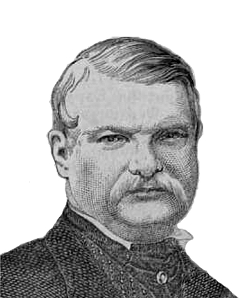 Carl Jaenisch (1813-1872) Get Carl Jaenisch's Games Books by Bill Wall |
Carl Friedrich Andreyevich von Jaenisch (pronounced YAY-nish) was born in Vyborg, Russia (50 miles northwest of Petersburg, close to Finland) on April 11, 1813. Carl had 6 siblings. His father, Andreas, died in 1832 and Carl was raised by his uncle, Karl, a surgeon. He began a military career in Finland, and then moved to Russia to teach mechanics in Petersburg. Jaenisch attended the Institute of the Corps of Railroad Engineers. In 1837, he published Decouvertes sure le cavalier (aux echecs). In 1838, he was an engineer and major in the Russian army. In 1838-39, he played a correspondence match with Lionel Kieseritsky, winning 1 game and drawing 1 game. In 1840, he left the Russian army to concentrate full-time on chess. Unable to support himself fully through chess, he worked in the Russian Ministry of Finance. In 1842, he visited Berlin an analyzed openings with Tassilo von der Lasa. In 1842, Jaenisch lost a match against Wilhelm Hanstein in Berlin. He lost 4, won 1, and drew 1. In 1842-43, Jaenisch published a book on the chess openings in two volumes, Analyse Nouvelle des ouvertures (A new Analysis of Chess Openings). The book was written in French, published in Dresden and St. Petersburg, and distributed in Paris, London, and Leipzig. It was the first scientific manual on chess openings with much original analysis. In 1844, he won one and lost one in a match with Alexander Petrov in Saint Petersburg. In the 1840s, Jaenisch was among the top chess players in the world. In 1847, Jaenisch analyzed 1.e4 e5 2.Nf3 Nc6 3.Bb5 f5, sometimes known as the Jaenisch Gambit, but more popularly known as the Schliemann Defense, after Adolf Karl Wilhel Schliemann (1817-1872). However, Jaenisch played it first. In March 1847, George Walker translated Jaenisch's book from French to English, calling it Jaenisch's Chess Preceptor. The book was published in London. There were further English editions in 1852 and 1855, but no Russian editions. In 1849, he won 2 and lost 1 in a match with Ilya Shumov (1819-1881), in Russia. In 1850, Jaenisch won 1 and lost 2 against Shumov in a match In Russia. [source: Chess Player's Chronicle, 1850, p. 193] In 1851, he (along with Petrov and Shumov) wanted to take part in the London 1851 chess tournament, but arrived too late in London. Instead, he played a match with Howard Staunton in August, and lost the match with 2 wins, 7 losses, and 1 win. This is the first record of a Russian playing a match abroad. In 1852, a complete translation in two volumes of the 1843 issues of Analysis of the Openings of the Game of Chess by Jaenisch was published in London. In 1853, Jaenisch, with the help of wealthy Grigory Kushelev-Bezborodko (1832-1870), established the St. Petersburg Chess Club. The club attracted up to 100 members. In 1854, he lost a chess match to Shumov, winning 3 games, losing 5, and drawing 4. In another match the same year, Jaenisch won 4, lost 2, and drew 2 against Shumov in Saint Petersburg. In 1854, he drew up a set of rules and regulations on chess. In published a revised charter in 1858 in both French and Russian. These were the first Russian chess codes and clarified many of the previously disputed rules of chess. In 1854, he played Prince Sergey Urusov, winning 2 and losing 2. In 1856, Jaenisch edited the first chess column in Russia in the St. Petersburg Gazette. In 1859, Jaenisch published a solution to the Knight's Tour in Chess Monthly. In 1862-63, he published Traite des aspplications de l'analyse mathematique au jeu des echecs, in 3 volumes. It included some solutions of the knight's tour. He died on March 17, 1872 (some sources say March 7) in Saint Petersburg.
|
Bill Wall
|

